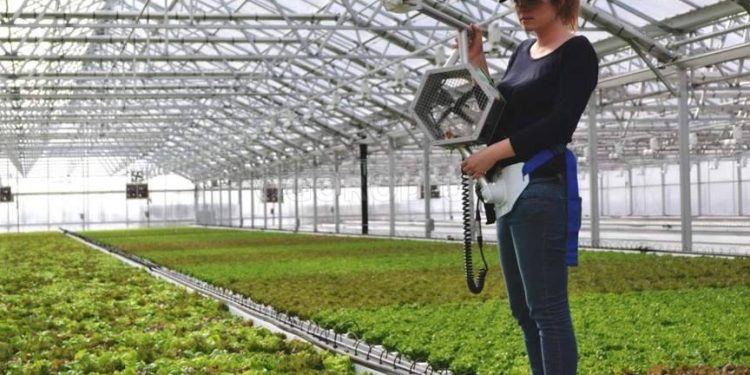#anti-viraltechnologies #greenhousevegetablegrowers #COVID-19 #TomatoBrownRugoseFruitVirus #pathogentransmission #NovelCompositeColdSprayCoatings #non-alcoholoil-basedhandrub #ozonetreatment #cropprotection #Ontario #GreenhouseCompetitivenessandInnovationInitiative #OMAFRA
Greenhouse vegetable growers in Ontario have been dealing with the threat of COVID-19 and Tomato Brown Rugose Fruit Virus (ToBRFV) for the past few years. ToBRFV is a significant economic threat to tomato plants, causing mosaic and distortion of leaves and unmarketable fruit. The virus can survive on surfaces for long periods, increasing the chance of infection and spread through the greenhouse. A recent Ontario Greenhouse Vegetable Growers (OGVG) research project tested three anti-viral technologies developed by PRODIGie – Innovation Evolved Inc. to control the spread of both pathogens. These technologies include Novel Composite Cold Spray Coatings, a non-alcohol oil-based hand rub, and an ozone treatment.
The Novel Composite Cold Spray Coatings can be applied to high-touch surfaces and aim to prevent microbial adhesion, resulting in a ten-fold increase in effectiveness compared to current copper benchmarks, with up to a 97% reduction in ToBRFV on surfaces. The non-alcohol oil-based hand rub with antimicrobial properties aims to inactivate pathogens on hands, providing longer protection and reducing overall spread by workers’ hands. The ozone treatment, containing oxidizers that can kill microorganisms, showed a 98% reduction in ToBRFV in just three minutes of contact with aqueous ozone.
All three solutions can be used together, providing a proactive crop protection strategy that is effective without requiring lengthy regulatory approval processes. While there is initial interest from growers, more grower trials are needed to validate the interest and determine the best commercialization strategies. With the ultimate goal of making the sector more resilient to pathogen threats, these anti-viral technologies could be a valuable tool for greenhouse vegetable growers in Ontario.
Funding for this research project was provided by the Greenhouse Competitiveness and Innovation Initiative, a cost-share program funded by the Ontario government and delivered by the Agricultural Adaptation Council on behalf of the Ontario Ministry of Agriculture, Food and Rural Affairs (OMAFRA).










